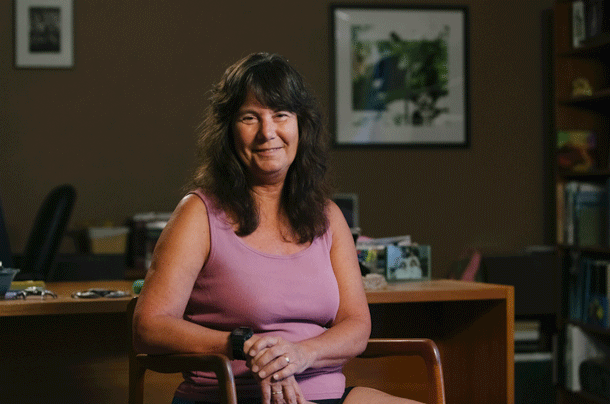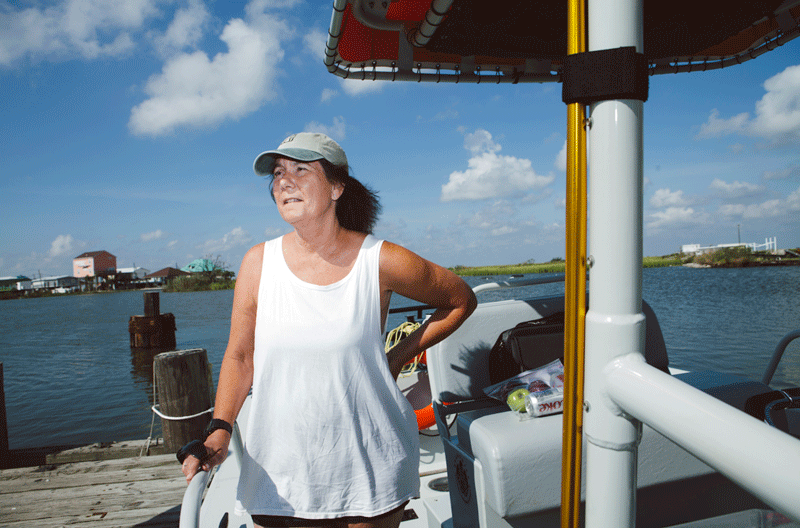Marine Biologist Nancy Rabalais Wins MacArthur Genius Grant
Air Date: Week of October 5, 2012

Nancy Rabalais is a Marine Ecologist and MacArthur fellow. (MacArthur Foundation)
One of this year's MacArthur fellows is a marine ecologist whose work focuses on dead zones in the Gulf of Mexico. Living on Earth's Bobby Bascomb profiles Nancy Rabalais and her work.
Transcript
CURWOOD: They are popularly known as "genius grants" - and every year the MacArthur Foundation gives out some two-dozen of them. Each fellowship comes with a no-strings attached prize of $500,000. And it goes to exceptionally creative and talented people in a wide variety of disciplines.
This year’s winners include a writer, a historian, a mandolin player - and marine ecologist Nancy Rabalais. She’s executive director and professor at Louisiana University’s Marine Consortium. Here's Living on Earth’s Bobby Bascomb.
BASCOMB: Nancy Rabalais got a surprise phone call one day telling her she’d won a MacArthur fellowship and half a million dollars.
RABALAIS: Surprised is really not the correct word. I was flabbergasted. It’s just so rewarding to be, you know, that well respected by my colleagues.

Nancy Rabalais at work in the Gulf of Mexico. (Photo: MacArthur Foundation)
BASCOMB: Rabalais has spent the last 28 years researching dead zones in the Gulf of Mexico. They’re areas of extremely low oxygen, inhospitable to most marine life.
RABALAIS: If a shrimp trawler puts the net over the side and drags it on the bottom he just won’t catch anything. No shrimp, no fish, no swimming organisms - they flee out of the area. And crabs, worms, starfish, snails, clams, they will all eventually die off if the oxygen stays low enough for long enough.
BASCOMB: The dead zone in the Gulf varies in size from year to year. In 2010 it was the size of New Jersey. It’s caused by nitrogen and phosphorus rich water flowing into the Gulf of Mexico.
RABALAIS: No matter how you slice or dice it, the overwhelming majority of nitrogen and phosphorus comes from agricultural activities. The Mississippi watershed drains about 41% of the contiguous United States and most of it is in agriculture.
BASCOMB: That includes states like Iowa, Nebraska, and Kansas where farmers use massive amounts of fertilizer. Runoff from farms and pastures make their way down the Mighty Mississippi and into the Gulf.
RABALAIS: And the nitrogen and phosphorus stimulate the growth of phytoplankton which eventually sink to the bottom and the decomposition of that deletes the oxygen.
BASCOMB: Rabalais says that when she first started this work it was hard to convince the public about the source of the problem.
RABALAIS: And it took a while for people to understand that something that could happen so far away from the Gulf of Mexico could be having a difference on the ecosystem. And now many people know about it. Many people are engaged trying to make a difference and changing what they do on their land so I think we’ve made great progress.
BASCOMB: Most of that progress, Rabalais says, comes from farmers experimenting with less harmful agricultural practices.
RABALAIS: So that includes different cropping techniques, less fertilizer use, precision fertilizer use, buffer strips, sustainable agriculture, deep-rooted crops. I mean, there are so many things that can be done. It’s going to take a combination of all these activities to make a difference.
BASCOMB: For Rabalais the 500,000 dollar prize will make a difference too.
RABALAIS: I’m going to try to support things that I can’t do normally; trips to spread more of the message to work with people at the policy level; to support students who need to travel to meetings; to buy equipment that I can’t afford otherwise. So it’s going back into the research.
BASCOMB: Into research and inspiring a new generation of scientists to carry on her work.
RABALAIS: I’m not giving up right away. I’ve got a lot left in me I guess. (laughs)
BASCOMB: Nancy Rabalais, Marine Ecologist and MacArthur fellow. For Living on Earth, I’m Bobby Bascomb.
Links
Living on Earth wants to hear from you!
Living on Earth
62 Calef Highway, Suite 212
Lee, NH 03861
Telephone: 617-287-4121
E-mail: comments@loe.org
Newsletter [Click here]
Donate to Living on Earth!
Living on Earth is an independent media program and relies entirely on contributions from listeners and institutions supporting public service. Please donate now to preserve an independent environmental voice.
NewsletterLiving on Earth offers a weekly delivery of the show's rundown to your mailbox. Sign up for our newsletter today!
 Sailors For The Sea: Be the change you want to sea.
Sailors For The Sea: Be the change you want to sea.
 The Grantham Foundation for the Protection of the Environment: Committed to protecting and improving the health of the global environment.
The Grantham Foundation for the Protection of the Environment: Committed to protecting and improving the health of the global environment.
 Contribute to Living on Earth and receive, as our gift to you, an archival print of one of Mark Seth Lender's extraordinary wildlife photographs. Follow the link to see Mark's current collection of photographs.
Contribute to Living on Earth and receive, as our gift to you, an archival print of one of Mark Seth Lender's extraordinary wildlife photographs. Follow the link to see Mark's current collection of photographs.
 Buy a signed copy of Mark Seth Lender's book Smeagull the Seagull & support Living on Earth
Buy a signed copy of Mark Seth Lender's book Smeagull the Seagull & support Living on Earth

